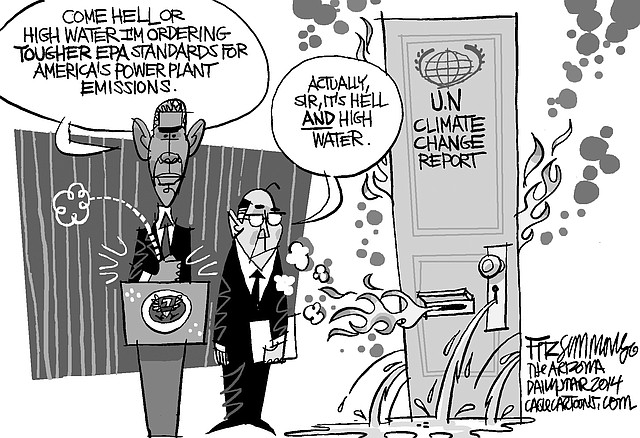Commentary: World's Energy Future Is Changing
Sunday, July 20, 2014
The tide is turning. Energy use is entering a time of fundamental change and great hope. Some changes have surprised me and changed my views about energy use and the climate problem.
Many nations are switching from coal and nuclear electricity, to renewables and efficiency. Germany gets 27 percent of its electricity from renewables, mostly from wind and photovoltaic solar, and plans to reach 80 percent by 2050. For comparison, 13 percent of U.S. electricity comes from renewables. Germany will scrap most fossil-generated electricity, while phasing out nuclear, by 2050. Their unprecedented solar energy growth has been fueled by a "feed-in tariff" that pays rooftop solar homes for electricity fed into the grid. These enlightened policies, plus energy efficiency, are putting Germany on the road to a carbon-free and nuclear-free future.
Ever since 1990, I had been mildly supportive of nuclear power as a welcome alternative to fossil electricity because of the threat of climate change. But the surprising success of the renewable and efficiency revolution, and the surprising severity of the Fukushima nuclear disaster in 2011, has changed the evidence. Fukushima is history's worst nuclear accident and is permanently changing Japan's energy economy.
World nuclear power grew quickly during 1960-1989, grew slowly during 1989 to its peak in 2002, and then slowly declined. Germany shut eight of its 17 reactors in 2011 following Fukushima, and will close the rest by 2022. The leading nuclear-energy nation, France, is under pressure to reduce its nuclear commitment. France's AREVA, the largest nuclear builder in the world, has been filing yearly losses due to high costs and delays. This reflects a global trend that was only amplified by Fukushima. Nuclear generation has declined by 12 percent since 2002, and nuclear power's share of electricity production has declined from its maximum of 17 percent in 1995 to 10 percent today.
The U.S. could duplicate Germany's success, but our fossil-fuel industry makes this difficult. Solar energy accounts for three-quarters of new U.S. electricity generation, thanks partly to rooftop solar. But more rooftop solar means customers buy less electricity from utilities, so utilities are pushing back by opposing feed-in tariff incentives and charging their solar customers additional fees.
The U.S. Supreme Court's 7-2 ruling allowing the Environmental Protection Agency to regulate greenhouse gas emissions from power plants is major good news. Coupled with the EPA's new regulation to cut carbon pollution from power plants by 39 percent from 2005 levels by 2030, this implies real changes in U.S. power generation and furnishes a good example to other nations. The new rules affect coal-heavy Arkansas more than most states, and demonstrate the foolishness of new coal plants such as Southwestern Electric Power Co.'s Turk plant near Texarkana. Environmentalists, along with one of the three Arkansas Public Service Commission judges, recommended in 2008 that the proposed plant be replaced by efficiency, renewables and natural gas. This would have greatly eased EPA's regulation of Arkansas' carbon emissions. SWEPCO was terribly wrong about this.
In a major new development, conservatives are finally coming around to the conservative view that we should insure ourselves against future disaster by taking action now on climate change. Former New York Mayor Michael Bloomberg, former secretaries of the Treasury Henry Paulson and Robert Rubin, former Secretary of State George Shultz, and others have authored a wake-up call titled "Risky Business: The economic risks of climate change in the United States."
This report's lead author, Henry Paulson, wrote in a New York Times op-ed column: "The solution can be a fundamentally conservative one that will empower the marketplace to find the most efficient response. We can do this by putting a price on carbon dioxide emissions -- a carbon tax. ...Putting a price on emissions will create incentives to develop new, cleaner energy technologies." Better yet, we need a carbon tax and dividend, with all income from the tax going back to consumers as dividend checks. Most consumers would break even between the tax and the dividend, or reap a net profit.
Further good news: Climate activism is blooming. The excellent Citizen's Climate Lobby is active in Fayetteville and around the nation, and the People's Climate March will take to the streets of New York City and cities all over the world on Sept. 21 to press for such action as campus divestment of fossil fuel investments. This tactic, by students, was notably effective in changing the former apartheid government of South Africa.
I'm hoping that, with all this upbeat activity, our dear mother Earth is beginning to smile again.
ART HOBSON IS A PROFESSOR EMERITUS OF PHYSICS AT THE UNIVERSITY OF ARKANSAS.
Commentary on 07/20/2014